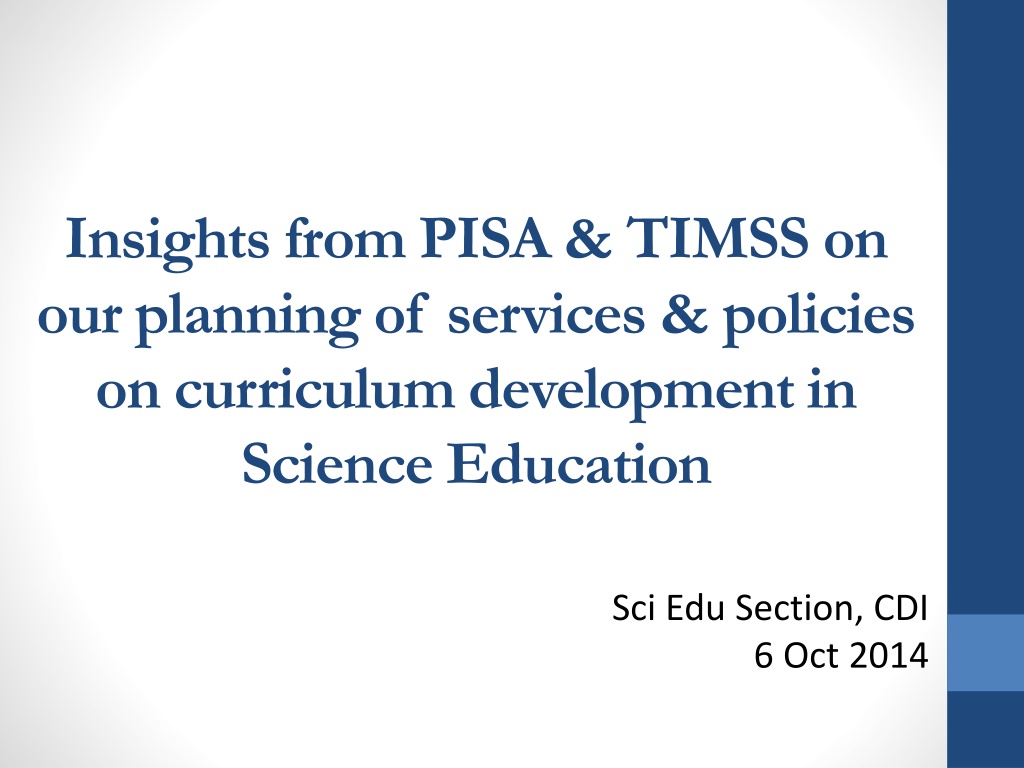
Insights from PISA and TIMSS on Curriculum Development in Science Education
Explore the impact of PISA and TIMSS assessments on curriculum development in science education, focusing on student assessment, frameworks for science assessment, and the focus of school science curriculum. Gain insights into student performance in TIMSS and PISA, with a special emphasis on Hong Kong's progress.
Download Presentation

Please find below an Image/Link to download the presentation.
The content on the website is provided AS IS for your information and personal use only. It may not be sold, licensed, or shared on other websites without obtaining consent from the author. Download presentation by click this link. If you encounter any issues during the download, it is possible that the publisher has removed the file from their server.
E N D
Presentation Transcript
Insights from PISA & TIMSS on our planning of services & policies on curriculum development in Science Education Sci Edu Section, CDI 6 Oct 2014
Student Assessment An integral part of learning and teaching Provides feedback to students, teachers, schools and parents on the effectiveness of teaching and students strengths and weaknesses in learning Provides information to schools, school system, government, employers to enable them to monitor standards and to facilitate selection decisions Assessment of learning, Assessment for learning, Assessment as learning
PISA Framework for Science Assessment How they do so is influenced by: Requires people to: Knowledge About the natural world (knowledge of science) About science itself (knowledge about science) Competencies Identify scientific issues Explain phenomena scientifically Use scientific evidence Context Life situations that involve science and technology Attitudes Response to science issues interest support for scientific enquiry responsibility
TIMSS Framework for Science Assessment EighthGrade Content Domains Cognitive Domains Biology Chemistry Physics Earth Science Knowing Applying Reasoning
Focus of School Science Curriculum Providing learning experiences for students to acquire scientific literacy Emphasizing Science, Technology, Society & Environment (STSE) connections Scientific investigations Science Process Skills Nature of Science 4 other strands: Life and Living, Energy and Change, The Material World, Life and Living Aims & Objectives Knowledge and Understanding
Student Performance in TIMSS and PISA TIMSS Hong Kong has been making steady progess and remained within top 10 from late 90s. Reasoning better than/comparable to Knowing , while in the past students did better in Knowing . PISA Ranked 2nd/3rdin scientific literacy among participating countries/regions
Student Performance in TIMSS and PISA (cont.) Students achievement is consistently well above international average The remarkable performance of Hong Kong shows that the school science education is heading in the right direction Reflection on the Curriculum Planning & Development Learning & Teaching, and Student Assessment
Sources of Feedback for the Review/ Implementation of Sci Edu KLA KLA Evaluation CD visits Focus group interviews International studies: TIMSS & PISA ... Further promotion of Assessment for Learning & Assessment as Learning
From KLA Evaluation About Student Assessment Majority of teachers agreed that: Use diversified modes of assessment to promote L&T Set appropriate assessment tasks (including practical and non- practical tasks) to align with the learning objective Use assessment data or information to provide quality feedback to students Students in general agreed that: Their teachers helped them to learn and understand their strengths and weaknesses Building on Strengths
Way Forward Continuous Promotion of Holistic Curriculum Planning & development in the Sci Edu KLA for a balanced school-based curriculum Curriculum, Pedagogy, Assessment form a trio Strengthening PIE Cycle (Planning, Implementation and Evaluation) in school-based curriculum development Strengthening the interface between different learning stages Enhancing collaboration among teachers
From Student Assessment to Enhancing Student Learning To identify and tackle students learning difficulties To develop relevant teaching strategies for enhancing learning effectiveness To enhance teachers awareness on the importance of reflective teaching based on students performance in daily formative assessment To build up teachers capacity in developing quality assessment items To enhance teachers assessment literacy
